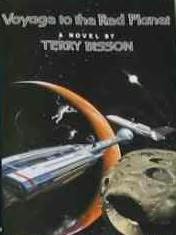I first read Voyage to the Red Planet from the library some time in the early nineties (it was published in 1990) and I recently came across a copy and re-read it for the first time. I remembered it as an enjoyable but fairly slight book, and that’s just what it is.
The first manned mission to Mars is one of the canonical SF themes. I don’t know how many times I’ve read it, by different authors, written in different decades. Mars has been fictionally reached by NASA, by the Soviets, by the Chinese, by Africans, by private enterprise, by mad genius inventors, and by kids building a rocket in their backyard. Only Terry Bisson would think of having it reached by Hollywood.
In Voyage to the Red Planet Bisson satirizes the film business, the space business, and the expectations of science fiction to produce a very odd little book that works almost in spite of itself.
The Mary Poppins was a joint NASA-Soviet ship, built and stocked and abandoned in orbit for twenty years when a new Depression hit. In this world the Soviets are still Soviet but they’re not communist and the Cold War is over. This must have seemed like a much more plausible prediction than what actually happened. I don’t remember thinking it was odd when I first read it. Now, well, Soviets on Mars does date it. His predictions for the US are that everything will be privatised—there are gags about the National parks being owned by Disney and a young person guilelessly says that it must have been terrible when the government paid for roads and the post office, nobody would have had any free enterprise, they must have been like robots. The book is full of this kind of reductio ad absurbam Libertarianism, which occasionally made me smile, but only occasionally. Movie stars are a hereditary caste. Cold sleep is used for “career spacing.” The Hollywood producer funding the mission gets fired and has to hustle to find backing, when they’re already on the way. they have to keep accepting collect calls with computer plotted course changes. This is clearly a future that concentrated on video instead of internet, as they have cameraphones and cameras that can digitally map in actors, but no onboard computers.
Beyond all the essentially silly “Let’s go to Mars just to make a movie” stuff, there’s a good story lurking. The characters are very well drawn. They’re caricature types—the female Soviet pilot, the plucky girl stowaway, the black doctor with dreams—but they’re developed into real people. There’s a real story with just as much actual science as you’d normally get in a first mission to Mars novel. One of the things that did make me laugh is the note of thanks at the beginning:
Thanks to David Ansen, Meg Blackstone, Kim Stanley Robinson and Charles Sheffield, who helped the author avoid many errors and grotesqueries. Those that remain in the book are the ones he just couldn’t resist.
Bisson is always good on description, and the descriptions of the Venus fly-by and of the way space is big and how being on Mars feels are done brilliantly.
Greetings pointed at the brightest star. It was blue white, like a drop of pond water hanging in space. “There’s Earth!”
Kirov shook her head. “That’s Venus,” she said. “We can’t even see Earth from here.”
The story progresses with technological failures and technological cobble-togethers and mysterious unexpected discoveries and tragic sacrifices and heroism. The tension between the desire to make an Oscar-winning movie and an actual Mars landing and exploration works in the book’s favour, because all the satire is on the Hollywood side and it’s possible to be drawn in and read the Mars side with the kind of naive wonder a more serious book would have to work hard to stir.
This is definitely a romp rather than a book to take seriously, but it’s a fun read. Bisson’s satire works better for me at short lengths, and this will never be my favourite of his novels, but I’m very glad to own a copy after all this time.
Jo Walton is a science fiction and fantasy writer. She’s published eight novels, most recently Half a Crown and Lifelode, and two poetry collections. She reads a lot, and blogs about it here regularly. She comes from Wales but lives in Montreal where the food and books are more varied.











I missed this when it came out, which is odd since I had been following Bisson as he developed his career in the magazines. But what it reminds me of in a lot of ways is a novel by, I think, Harry Harrison, involving a scheme where a Hollywood production time travels to ca. 1000 AD to film. All I really remember about it is that the starlet winds up staying and has a son she calls Snorri (after one of the seven dwarves).
If anybody knows what I’m talking about, I’d love to have more details. I was thinking it was The Starcrossed, but that’s by Ben Bova. I’m almost certain it was Harrison.
Aaand, of course, as soon as I posted, I found it. It WAS Harrison: The Technicolor Time Machine.